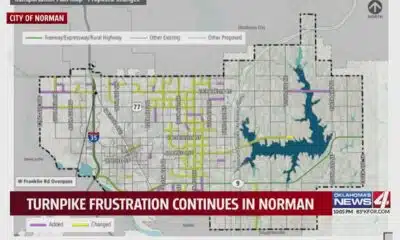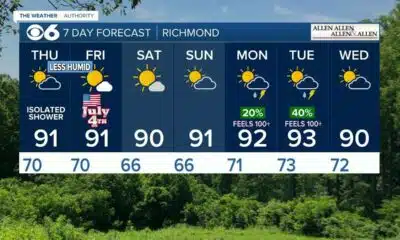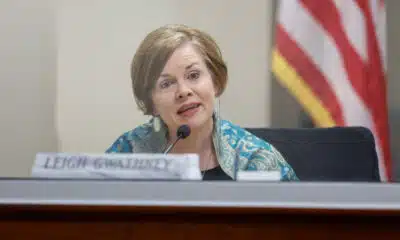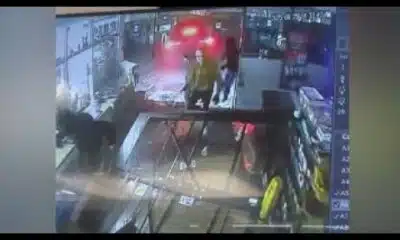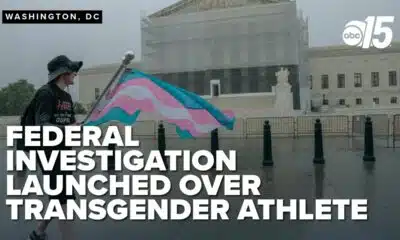News from the South - Virginia News Feed
Earle-Sears’ uncontested run ends as rivals enter Virginia GOP primary for governor
Earle-Sears’ uncontested run ends as rivals enter Virginia GOP primary for governor
by Markus Schmidt, Virginia Mercury
February 27, 2025
Lt. Gov. Winsome Earle-Sears began the week as the clear Republican gubernatorial frontrunner, but in just days, her once-uncontested path to the nomination has turned into a primary fight. With 10 months until Virginia’s gubernatorial election, two GOP challengers have jumped into the race, shaking up the contest and setting the stage for the showdown with former U.S. Rep. Abigail Spanberger, the presumptive Democratic nominee.
Former state delegate Dave LaRock and former state senator Amanda Chase declared their candidacies within days of each other, throwing the Republican primary into uncertainty. Their entries come just as Spanberger opened a double-digit lead over Earle-Sears for the first time in a Roanoke College poll released earlier this week.
LaRock, a former state delegate from Loudoun County, is positioning himself as a staunch conservative alternative to Earle-Sears.
His campaign website touts him as a “proven conservative leader who delivers” and promises to “protect taxpayers’ money from fraud and waste, uphold constitutional rights, defend life, and ensure safe communities and schools.”
LaRock has also voiced support for the federal Department of Government Efficiency (DOGE), an initiative led by billionaire Elon Musk. He has not responded to requests for comment for this story, but his website takes aim at Earle-Sears, claiming she “offers platitudes and backtracks on conservative values.”
Chase, who represented Chesterfield County in the state Senate for eight years before losing a primary challenge to Sen. Glen Sturtevant, is no stranger to statewide campaigns — or controversy.
Chase has been widely characterized as a far-right figure and a promoter of election conspiracy theories. She has been called one of Virginia’s most vocal spreaders of false claims about the 2020 election and drew attention for attending Trump’s rally before the Jan. 6, 2021, attack on the U.S. Capitol.
In response, the Virginia Senate voted 24-9 in a bipartisan censure, citing “conduct unbecoming a senator” and accusing her of “fomenting insurrection against the United States.”
Chase previously launched an unsuccessful bid for governor in late 2020, branding herself as “Trump in Heels.” After her Senate defeat, she moved to Appomattox to seek the Republican nomination in Senate District 10, but lost in a party-run mass meeting to Republican Luther Cifers.
In a phone interview Thursday, Chase said she believes Earle-Sears may struggle to qualify for the primary ballot, citing campaign “turnover and upheaval.” Dave Abrams, a spokesman for Earle-Sears, called these allegations “patently false.”
Chase emphasized her ability to mount a viable challenge, pointing to her past electoral experience and campaign infrastructure. “I believe I could beat Abigail Spanberger,” she said. “Winsome Earle-Sears has alienated a lot of Trump supporters when she said she didn’t support Trump’s second run for president. People want a candidate that has not denounced President Trump.”
Chase also stated she would welcome an alliance with Elon Musk to combat wasteful spending in Virginia. “We need a DOGE in Virginia. We need Elon Musk,” she added.
While LaRock has officially filed his paperwork and Chase is in the process of doing so, both candidates still face a significant hurdle — securing 10,000 signatures, including 400 from qualified voters in each of Virginia’s 11 congressional districts by April 3 to qualify for the primary ballot. Chase acknowledged the challenge, calling it a “heavy lift for anybody,” but she expressed confidence in her campaign’s ability to meet the requirement.
Earle-Sears, who has served as lieutenant governor since 2022, faces some pushback from within her party, particularly because she publicly urged Republicans to “move on from Trump” later that year.
Both LaRock and Chase are likely to seek Trump’s endorsement, a potential key factor in the primary battle. The situation mirrors the 2024 Republican primary in Virginia’s 5th Congressional District, where Trump-backed challenger McGuire ousted then-Rep. Bob Good, R-Farmville, after the former president withdrew his endorsement of the incumbent.
Despite the primary challenge, Earle-Sears retains strong institutional support. On Wednesday evening, Gov. Glenn Youngkin took to X to reaffirm his backing of Earle-Sears, calling her “Virginia’s next governor.” He praised her record on parental rights, law enforcement, business growth, and tax relief, pledging to “stand with her every step of the way as our party unites and she wins in November.”
And Adams, the Earle-Sears campaign spokesman, dismissed concerns about her primary opponents. “Winsome is a winner, plain and simple,” he said in a text message Thursday.
“She has an extraordinary personal story and a long record of fighting for and delivering common-sense conservative policies that make life in Virginia better. That’s why the groundswell of support for her campaign has grown too big to beat in any prospective primary.”
David Richards, a political science professor at the University of Lynchburg, said Earle-Sears is not in serious trouble yet but warned that Trump’s endorsement could be a game-changer.
“Youngkin’s endorsement helps her enormously. A candidate like LaRock poses some risk for her because he could gain momentum. Chase is less of a threat; she strikes me as an opportunistic candidate, jumping in because she expects to get some political mileage out of it, not because she would be a serious pick for the GOP.”
Richards noted that if Trump endorses LaRock or another candidate, Earle-Sears could face a serious challenge. “Trump may not determine who wins the governor’s election next November, but he will probably determine who the GOP nominee is.”
Maggie Amjad, spokesperson for the Democratic Party of Virginia, framed the Republican primary turmoil as a sign of weakness for Earle-Sears.
“The Republican field erupting in chaos and infighting confirms that Winsome Earle-Sears is a highly flawed candidate with a flailing campaign and an inability to unite the Republican party,” Amjad said.
“While Virginians deserve a governor who fights for the commonwealth, these Republican candidates are only focused on causing chaos, attacking Virginia jobs and workers, defunding public schools, and ripping away reproductive rights.”
YOU MAKE OUR WORK POSSIBLE.
Virginia Mercury is part of States Newsroom, a nonprofit news network supported by grants and a coalition of donors as a 501c(3) public charity. Virginia Mercury maintains editorial independence. Contact Editor Samantha Willis for questions: info@virginiamercury.com.
The post Earle-Sears’ uncontested run ends as rivals enter Virginia GOP primary for governor appeared first on virginiamercury.com
News from the South - Virginia News Feed
Rain clearing out, dry conditions expected for holiday weekend
SUMMARY: Rain is clearing out, bringing drier conditions for the holiday weekend. After recent rains, humidity and dew points remain high but are expected to drop as two cold fronts move through, reinforcing drier air. Temperatures will rise into the upper 80s and low 90s with mostly clear to partly cloudy skies and a low chance (less than 20%) of isolated showers tomorrow. Coastal areas like Virginia Beach will see comfortable mid-80s and calm waters. The weekend looks dry and pleasant, with the next rain chance likely early next week as humidity gradually increases again.
Rain clearing out, dry conditions expected for holiday weekend
News from the South - Virginia News Feed
Sickle cell research threatened by federal 'Big Beautiful Bill' funding cuts | NBC4 Washington
SUMMARY: Federal funding cuts threaten sickle cell research, especially the Sickle Fit program led by Dr. Charity Oyedeji at Duke University. After eight years of work aiding patients with physical therapy for chronic pain, the NIH revoked her $750,000 grant, citing a low return on investment and claiming DEI-related studies promote divisiveness. Sickle cell disease affects about 100,000 people in the U.S., mostly Black patients, causing severe complications. Patients like Linda Combs credit research with life-saving treatments like gene therapy. Oyedeji is appealing the decision and seeking new funding sources, emphasizing the research’s proven benefits in improving patient outcomes.
A doctor says she’s scrambling to figure out how she’ll continue her work helping sickle cell disease patients after the National Institutes of Health (NIH) cancelled her $750,000 research grant, citing DEI and divisiveness as a factor. News4’s Aimee Cho reports.
_______
NBC4 Washington / WRC-TV is the No. 1 broadcast television station and the home of the most-watched local news in Washington, D.C. The station leads the market in providing timely and breaking news and information in text, video and graphics across more than 15 platforms including NBCWashington.com, the NBC4 app, NBC4 streaming news channel, newsletters, and social media.
FOLLOW & STREAM NBC4 WASHINGTON
NBC4 News Streaming channel: https://www.nbcwashington.com/watch/
Xumo Play: https://play.xumo.com/live-guide/nbc-washington-dc-news
Roku: https://therokuchannel.roku.com/watch/021707311e0b595597f97a389e0051e6/nbc-washington-dc-news
Also available on Pluto TV, Freevee, Google TV, TCL, Local Now, and Samsung TV Plus.
More here: https://www.nbcwashington.com/watchlive/
Instagram: http://nbc4dc.com/3HxYkYH
Threads: http://nbc4dc.com/ZYZAAHJ
Facebook: http://nbc4dc.com/iD1GvRQ
X: http://nbc4dc.com/APF7vQM
TikTok: http://nbc4dc.com/pg5Nx67
VISIT OUR SITE: https://www.nbcwashington.com/
DOWNLOAD OUR FREE APPS: https://www.nbcwashington.com/products/
WATCH NBC4 LIVE ON AMAZON FIRE TV: https://www.nbcwashington.com/firetv/
WATCH NBC4 LIVE ON ROKU: https://www.nbcwashington.com/roku/d
News from the South - Virginia News Feed
Jury reaches verdict on 4 of 5 counts in Diddy trial; judge indicates they'll keep deliberating
SUMMARY: The jury in Sean “Diddy” Combs’ trial has reached a partial verdict on four of five counts but will continue deliberations, the judge announced. They have sent multiple notes requesting specific testimony, particularly from Cassie Ventura, Combs’ ex-girlfriend and key witness. Ventura alleged that Combs used force and fear to coerce her into drug-fueled sexual performances with male escorts, including a 2016 incident captured on video. The jury is focusing on the trafficking charges and evidence of coercion. Combs denies all charges, claiming all encounters were consensual. If convicted on all counts, he faces life imprisonment.
If convicted, Sean ‘Diddy’ Combs could face life in prison.
-
Mississippi Today6 days ago
Defendant in auditor’s ‘second largest’ embezzlement case in history goes free
-
News from the South - Georgia News Feed5 days ago
Are you addicted to ‘fridge cigarettes’? Here’s what the Gen Z term means
-
The Conversation6 days ago
Toxic algae blooms are lasting longer than before in Lake Erie − why that’s a worry for people and pets
-
News from the South - Tennessee News Feed6 days ago
5 teen boys caught on video using two stolen cars during crash-and-grab at Memphis gas station
-
News from the South - Kentucky News Feed7 days ago
Error that caused Medicaid denials has been corrected, says cabinet in response to auditor letter
-
News from the South - Georgia News Feed7 days ago
GOP mega-bill stuck in US Senate as disputes grow over hospitals and more
-
News from the South - South Carolina News Feed5 days ago
Federal investigation launched into Minnesota after transgender athlete leads team to championship
-
Local News6 days ago
St. Martin trio becomes the first females in Mississippi to sign Flag Football Scholarships

